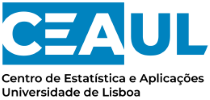 Prof.ª Ana Borges
Prof.ª Ana Borges- Instituto Politécnico do Porto
- FCUL – Bloco C/6 Piso 4 Sala: 6.4.30 – (5ª feira) – 14:30
- Quinta-feira, 7 de Março de 2019
- Referência Projeto: UID/MAT/00006/2019
Among the inherent objectives of Science, the simplification of reality, the explanation and resolution of problems are the most immediate. With the dynamic and scientific development of industrial processes, companies will increasingly benefit from the transfer of knowledge between the academy and the industrial poles, promoting a close articulation between theory and practice. In this sense, and particularizing for the area of Statistics, will be presented two studies developed within the scope of challenges proposed by companies in two different European Study Group with Industry (ESGI – https://ecmiindmath.org/study-groups/).
The first challenge, presented by EDP, focuses on the problem of forecasting electricity prices. We ajusted a model for the hourly prices of the Iberian Electricity Market (MIBEL) from January 1, 2015 to June 26, 2016. Resulting that a longitudinal approach, considering a mixed effects model, with day of the week as a fixed effect, group of hours as a random effect and an AutoRegressive component of order 7 describing the dependence within hours, returns a model that explains the intra-day and intra-hour dynamics of electricity prices per hour. The second challenge aimed to find a solution for the case study of performance evaluation of water meters, proposed by Infraquinta (Algarve, Portugal). The main objective was to discover the point of change in the water meter performance and the moment suited for its replacement. Making use of the Seasonal Trend Decomposition of followed by the detection of structural breaks in the trend component (directly related to the performance of the counter) it was possible to detect the breakpoints of the water meter.
Both of the presented challenges are intended to serve as clarifying examples of how the industry benefits directly from an approach to academia.
